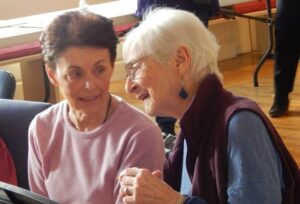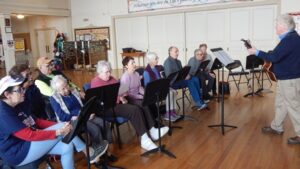
By Melanie Petrucci, Senior Community Reporter
Shrewsbury – Something special happens on Monday mornings at the First Congregational Church in Shrewsbury. A group of people gather for choir practice but this isn’t an ordinary church choir – it’s the Parkinson’s Chorus of Central Massachusetts. It is one of the church’s outreach programs.
On Feb. 4, the “Parkies” as they call themselves, were practicing for an upcoming concert with a Valentine’s theme. They will also perform selections from The Beatles songbook at an event in March at the Southgate Retirement Community in Shrewsbury.
Formed in 2015, the group is made up of about 15 enthusiastic participants from the greater Worcester area.
Volunteer facilitator David Russell said that for many, Mondays are their favorite day of the week. There is no fee to join and no signing experience is needed. Songs range from easy pop tunes to the old standards and ballads.
“The chorus is accompanied by Curtis Smith who is the music director of the First Congregational Church and the director is Denis Coughlin who is also the music director from Prince of Peace Parish in Princeton,” Russell noted.
The chorus is supported by a grant from the American Parkinson Disease Association’s Massachusetts Chapter and was formed by a group of people who had participated in a clinical research project to study the effects of singing as a treatment for lost vocal strength, one consequence of the disease.
David Lucht, 76, of Shrewsbury and Wendy Driscoll, 77, from Westborough were members of this research group that was conducted at the University of Massachusetts Amherst. Lucht has had the disease for seven years while Driscoll has lived with it for 18.
“Initially we started out under the direction of the speech therapist from UMass who was doing research on whether singing had a positive effect on breathing and sound-making in Parkinson’s patients,” Driscoll explained. “We met for 10 consecutive Saturdays here at the First Congregational Church and we had a concert at the end of that 10-week period for the Worcester Parkinson’s Association.”
Driscoll noted that they were excited that there was an improvement in their vocal strength and breathing after the 10-week time-frame. Even though the study was complete, they decided they wanted to continue singing.
“People think of people with Parkinson’s as Mohammad Ali and Michael J. Fox, people who shake – it’s a minor part of the disease. It’s a brain disease and it depends on which part of the brain is affected as to what your symptoms are,” Lucht added. “Speech and breathing is a big one for us and that is why we are singing.”
Driscoll has been involved with choral singing most of her life but it got to a point where she had difficulties holding a note so she thought her singing days had come to an end.
Lucht had no prior singing experience but was eager to give it a try. When not singing, he is an amateur portrait artist.
Both agree that coming to choir practice is one of the best parts of their week.
For more information about the chorus, contact David Russell at dasrusl@charter.net or 508-753-1660.
photos/Melanie Petrucci













